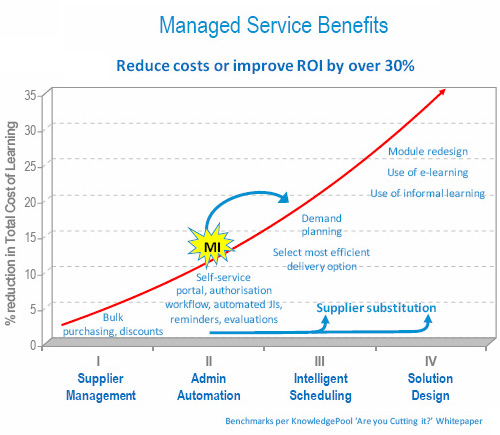What does the future hold for managed learning? Al Bird of KnowledgePool says a different relationship style will develop and clients can look forward to new partnering capabilities, competency level agreements and more measurable business benefits.
Managed learning services have long provided valuable support to organisations looking for specialist help to source or administer training on their behalf. The initial client motivation for this approach was cost savings – typically preferential supplier rates and convenience in accessing quality training via a trusted single source. As the market developed, the emphasis expanded to focus on improving the quality of service provided. When managed learning providers showed that they could deliver, clients began asking them to take on more learning activity. Today's clients are now developing sophisticated partnerships to help them optimise the efficiency and effectiveness of their corporate learning.
Variants on the theme
Most businesses recognise the fundamental value of learning and development as a means of maximising the engagement and potential of staff, and as a way of maintaining a competitive edge in the marketplace. Over the last decade, L&D teams have been trying to improve the way they manage, procure and administer their learning, and an increasing number of businesses have chosen to outsource elements of their L&D needs to professional organisations which offer managed learning services.
 "Most businesses recognise the fundamental value of learning and development as a means of maximising the engagement and potential of staff, and as a way of maintaining a competitive edge in the marketplace."
"Most businesses recognise the fundamental value of learning and development as a means of maximising the engagement and potential of staff, and as a way of maintaining a competitive edge in the marketplace."Over that time, many variants of the managed training service theme have emerged from many different types of provider (whether consultancy, training delivery organisation or vendor independent specialist) with a range of benefits to be gained depending on the curriculum areas or processes involved.
In our experience of running managed learning services over the last 10 years, there are four stages of progression that lead to the higher order benefits that can now be achieved with the latest systems, processes and economies of scale.

The first stage is where training suppliers are consolidated to increase the client's purchasing power. Stage two involves automating administration to create greater efficiency through technology. The third stage uses intelligent scheduling to maximise class-fill and resources. The final stage involves selecting the most cost-effective delivery method for each and every intervention.
Key to the latter two stages is the centralised management information which is drawn from a single system that operates standard processes. This information enables more informed decision making. Used effectively, it can significantly improve return on investment and the credibility of L&D through more data-driven curriculum planning.
One of the major target benefits of outsourcing has long been to free up the in-house L&D team to 'be more strategic', in order to improve business alignment and to enhance performance (rather than just make tactical cost savings). The steady evolution of the industry, and recent innovations in managed learning relationships, have made step changes towards this end through improved business partnering support and expert analytics of management information for better planning and continuous improvement. To make this step change requires a different relationship style from the traditional 'client-supplier' engagement. A deeper partnership is necessary.
Demand planning and informal learning
By combining proactive demand planning services with the insightful MI available, managed learning providers are able to present valuable recommendations to their clients on how they can reduce unnecessary training, cut out inefficiencies and better align their learning with business needs. As partner rather than supplier, the independent managed service provider can act as the conscience of the client organisation to help them manage budget allocation more effectively – drawing on the best innovations in the market while maximising the use of internal and informal options.
Progressive organisations are now looking for new partnering capabilities such as the expertise to route learning needs to the most appropriate solution every time, whether that's harnessing informal learning 'workscapes' (to coin a Jay Cross phrase), an in-house course, self-study elearning, a coaching programme or a best-in-class external supplier. To deliver this level of service, managed learning providers need to get actively involved in client budgeting cycles. For this, they need a detailed understanding of the client's in-house learning delivery options.
Competency level agreements
There are already risk/reward models in place for reducing the cost side of the RoI equation – holding the provider accountable for measurably reducing direct and indirect training costs. It is becoming more common to see examples of training provider programmes being tied to the productivity benefits side of the equation. In future, this may feed into broader commercial models based around learning outcomes, and it may yet become possible for managed service arrangements to become based on measurable competency level agreements (more than the current service level agreements).
"The holy grail for managed learning providers is to demonstrate measurable business benefits from a one-stop-shop of cost-effective just-in-time learning and collaboration resources (including formal and informal methods) making the most of all available resources."
The holy grail for managed learning providers is to demonstrate measurable business benefits from a one-stop-shop of cost-effective just-in-time learning and collaboration resources (including formal and informal methods) making the most of all available resources. Informal learning - which presents an interesting anomaly for learning management in general (as by definition informal learning can't be 'managed') - will still be a key feature of progressive managed learning services. This is one of the major development opportunities for business partners as the environment in which informal learning happens can be fostered and successful performance improvement examples can be championed to increase uptake (and reduce unnecessary reliance on traditional formal training options).
Implications
A sophisticated managed learning service of this nature challenges conventional supplier-client relationships and demands a deeper level of trust and partnership. There are also political challenges to wrestle with in aligning budgets centrally and agreeing a common governance framework, so that training requests are always assessed according to a defined set of guidelines which are aligned to the strategic needs of the business. This typically demands concerted effort between HR, procurement, finance and business leaders to target and champion the available innovations.
As the ubiquity and effectiveness of informal and social learning practices become more widely recognised and encouraged, new managed service models and outcome-based commercial mechanisms will offer appealing ways to support the next stage of development for progressive learning organisations.
Al Bird is learning consultancy director at KnowledgePool. He can be contacted at [email protected]










